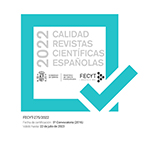Ellas y solas. La vulnerabilidad y la ausencia en la producción literaria gallega marcada por el exilio
Resumen
En este artículo, partiendo de algunos ejemplos de Rafael Dieste y Luís Seoane, indagamos en la razón por la cual en algunos textos de autores exiliados tras el golpe de estado de 1936 la viuda de vivo, como modelo fundacional de la espera, deja de ser apenas una metáfora de la feminidad que encarna la nación. La construcción de la memoria y de la identidad simbólico-cultural del exilio y de la emigración gallegas están hechas en clave de odisea colectiva. Por lo tanto, la comunidad transnacional ha de tener un vínculo con la idea de retorno. De ahí la importancia central de la representación de la ausencia y de la espera en sus obras y la presencia de la viuda de vivo como representación de la nación. Sin embargo, en muchas ocasiones, la mujer real resurge de la metáfora cuando los exiliados la tratan como sujeto histórico mereciente de memoria y conectado con el presente. Del mismo modo que acontecía en la sección “Viúvas de vivos” de Follas Novas, al centrarse en la situación durísima en la que ellas viven, le devuelven la voz que la mitificación y la descorporización les arranca. Esto ocurre porque estos autores, como desterrados, escriben desde una posición exílica dentro del sistema literario, de modo semejante a como escribía Rosalía de Castro por el hecho de ser mujer. Desde este espacio marginal se ven obligados a afrontar los valores decimonónicos y patriarcales sobre los que se asienta el naturalizado vínculo entre nación y cultura, aportando otras lecturas que el nacionalismo esencialista había dejado fuera y que ellos necesitaban para hacer una reconstrucción de la identidad nacional desde posiciones ideológicas nuevas derivadas de la vivencia de la Guerra Civil y de la necesidad de convivir y dialogar con otras culturas.Descargas
Descarga artículo
Licencia
La revista Madrygal. Revista de Estudios Gallegos, para fomentar el intercambio global del conocimiento, facilita el acceso sin restricciones a sus contenidos desde el momento de su publicación en la presente edición electrónica, y por eso es una revista de acceso abierto. Los originales publicados en esta revista son propiedad de la Universidad Complutense de Madrid y es obligatorio citar su procedencia en cualquier reproducción total o parcial. Todos los contenidos se distribuyen bajo una licencia de uso y distribución Creative Commons Reconocimiento 4.0 (CC BY 4.0). Esta circunstancia ha de hacerse constar expresamente de esta forma cuando sea necesario. Puede consultar la versión informativa y el texto legal de la licencia.








